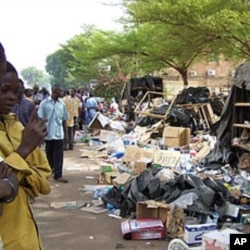Burkina Faso's President Blaise Compaore is facing what appears to be the stiffest resistance ever to his nearly quarter-century rule of the West African nation. Analysts are seeing connections between Burkina's unrest and the revolutions sweeping the Arab world.
Hundreds of military rank-and-file, just 200 miles from this nation's capital, fired shots in the air Tuesday night, in the latest act of defiance against Burkina Faso's President Blaise Compaore.
West Africa's longest-serving leader, a former military officer who rose to power in a 1987 coup, President Compaore finds himself beset with an army demanding better pay and living conditions.
They aren't the only ones. Students, civil servants, and farmers in this landlocked, aid-dependent country have staged nationwide strikes over the past six months.
In a different year those might just be routine disturbances, says political analyst David Zoumenou at South Africa's Institute for Security Studies.
But Burkina has never found itself so isolated and weak, he says. Its economic lifeline of remittances from Ivory Coast has been shredded by that country's political violence. Its other lifeline - Libyan aid - has completely vanished as that country's leader, Compaore ally Moammar Gadhafi, confronts a civil war.
"I think that if it were not happening in the completely different context of the post-Arab revolutions, I would have seen it as a routine challenge to Compaore's rule, but this time around it has gained momentum," he said.
Military mutinies, including an April 14 disturbance that forced the president to flee his capital, have been matched with insurrection in the country's civilian population.
Since February, students have staged regular and sometimes chaotic protests following the death of a young man in police custody.
On Tuesday, 8,000 of the country's cotton farmers began an anti-tax boycott that could further weaken a state which can hardly afford to pay its soldiers.
"Compaore has reason to be scared," says analyst James Clinton Francis at London's Eurasia Group. But Francis says the president also has time to reform.
He notes the country's malcontents have yet to coalesce around an opposition figure or platform. Its students and soldiers share little ideological ground, and in many respects, Francis says, both are demonstrating for better government treatment, not for a different government.
A coup d'etat he says, is not yet a cause for concern. "But I would remain vigilant. One of the key sign posts is if student groups, trade groups, and military groups link up and protest against Compaore, I think we'll see protests reach a new level in the country, and also if they rally around an individual to sort of challenge Comapore's rule," said Francis.
Francis says it is difficult to imagine who could unite this country's fragmentary opposition sects. He adds that like many African nations which have been ruled for decades by a single leader or government, Burkina Faso has allowed little space for an opposition political party to develop.
But the same, Zoumenou says, could have been said about Egypt or Tunisia, where mass uprisings forced out dictators who had clung to power for decades.
He says Burkinabé are just waiting for a moment - a trigger, a rallying cause - to go into the streets. "Having witnessed the changes taking place in the region, I think no leader in West Africa is immune from popular protests and the challenge to their rule," said Zoumenou.
At 60 years old, Compaore finds himself isolated in his region, Francis says. Military leaders who came to power, as he did, have largely faded from West Africa's scene and long unstable countries like Ivory Coast, Guinea, or Nigeria have held their freest, fairest elections in decades.
Burkina's last election, in November, when Compaore won a fourth term with 80 percent of the vote, suffered from extremely low turnout.
Francis says that factor - Burkina Faso's apathy - may be Compaore's last strength as he governs through what could very well be his final years in office.
"There's no opposition figure or person that really can unite the people against the sitting head of state. So until that happens Compaore is sort of sitting safe, in my opinion, because there's no one to directly challenge him," he said.
Shops in the country's second largest city, Bobo-Diooulasso, stayed closed today on fears that military members would continue lootings that accompanied last night's gunfire. The country's communications minister has called the army's actions "unacceptable."












